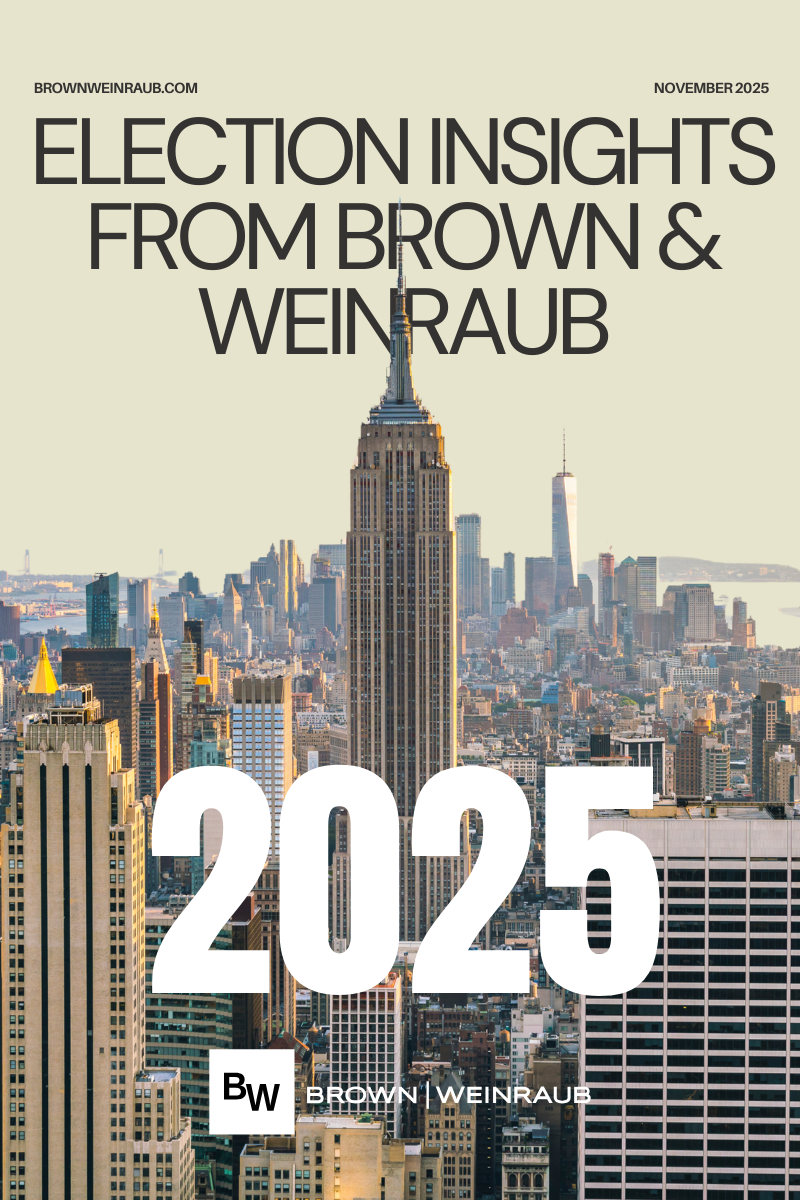
November 5, 2025
Last night was history-making, with Assemblymember Zohran Mamdani becoming NYC's first Muslim and first South Asian mayor. Mamdani's victory speech framed the win as a mandate for working-class priorities: rent freezes/stronger tenant protections, "fast and free" public transit, universal childcare, labor rights, and anti-corruption reforms. He opened with an Eugene Debs line about "the dawn of a better day," invoking inclusive, pro-immigrant themes. He also quoted Governor Mario Cuomo's famous line, "You campaign in poetry; you govern in prose", acknowledging that the work to achieve his ambitions for the City will not be easy and will take the cooperation of Albany.
For example, it is likely a "fast and free" MTA vision from City Hall could translate into asks for sustained state subsidies/dedicated revenues, which could reopen debates around congestion-pricing implementation details, payroll or high-earner surcharges, and operating support in the State's FY26 budget. We can also likely expect a revenue package conversation related to higher tax rates on high-earner brackets. If this is the case, Governor Hochul will face increased leftward pressure heading into the Executive Budget on how far to go on tenant protections, transit operating dollars, and childcare expansion—balancing business community concerns against a visible electoral mandate from the state's largest cities.
Yesterday’s election also saw New York City voters approve four major ballot measures designed to modernize and streamline the city’s land-use and development approval processes. Taken together, these measures are intended to speed up rezonings connected to affordable housing by shortening public review timelines, creating faster pathways for publicly financed housing, simplifying approvals for smaller zoning and infrastructure actions, and establishing a new appeals mechanism to prevent political stalemates that could halt critical projects.
Passed: Ballot Question 2: Fast-Track Affordable Housing Approvals
This measure creates two accelerated review tracks for certain affordable housing developments. Publicly financed affordable housing could now move through a shortened 90-day review process, with 60 days at the Community Board and 30 days at the Board of Standards and Appeals (BSA). In the 12 community districts with the lowest levels of affordable housing, reviews will proceed in parallel, and the City Planning Commission (CPC) will issue final decisions instead of the City Council. The goal is to reduce delays and speed the delivery of affordable housing, particularly in neighborhoods that need it most.
Passed: Ballot Question 3: Streamlined Review for Small Housing & Infrastructure Projects
This measure creates an Expedited Land Use Review Procedure (ELURP) for modest zoning changes, small increases in housing, land actions supporting affordable housing, and infrastructure projects related to climate resilience. The process maintains local review, providing 60 days for Community Boards and Borough Presidents, followed by 30 days for the CPC to issue a final decision. These projects will no longer require City Council approval. The intent is to advance smaller-scale housing and infrastructure improvements more efficiently while preserving community input.
Passed: Ballot Question 4: Affordable Housing Appeals Board
This measure establishes a new Affordable Housing Appeals Board composed of the Borough President, the City Council Speaker, and the Mayor. The board can overturn City Council decisions that block or modify affordable housing projects if at least two members agree. The purpose is to prevent political gridlock from stopping essential housing developments with broad support.
Passed: Ballot Question 5: One Centralized Digital City Map
This measure consolidates five separate borough map systems into a single digital City Map overseen by the Department of City Planning. Replacing thousands of individual paper maps, the unified digital system will streamline mapping and address assignments making the city’s development process clearer, faster, and more efficient.
New York City was not the only City to make history with its mayoral election last night; in Albany Dorcey Applyrs (D) was elected the first Black mayor in the City's 300-plus-year history. Three from Brown & Weinraub spearheaded an Independent Expenditure campaign called ‘Albany Forward’ to support Dorcey’s candidacy with polling, mail and digital ads. Others from the firm were very generous with their ideas and, of course, money. The mayor elect has asked David Weinraub to serve as one of three co-chairs for her transition. In Syracuse, Sharon Owens (D) was elected the City's first Black mayor and its second woman mayor. In Buffalo, Sean Ryan (D) won decisively (≈71%), and will be the first new mayor to hold office after two decades of Byron Brown's (D) mayoral rule.
Assembly special election. Last night also marked the election of Michael Cashman (D - AD-115 (North Country), in a special election over Brent Davison. Mr. Cashman will take Billy Jones' (D) seat, who resigned from the Assembly this summer to become Vice President at Clinton Community College.
With Zohran Mamdani's win, and Assemblymember Harvey Epstein (D) winning a New York City Council seat last night, there will need to be two special elections for Assembly Districts 36 and 74, respectively.
In a key East Bronx battle, union-backed Shirley Aldebol (D) defeated incumbent Kristy Marmorato (R) in the 13th District, reclaiming the borough’s only flipped seat with a return to blue in a district that had briefly turned red.
Across the river, Mikie Sherrill (D) defeated Jack Ciattarelli (R), who had been polling neck and neck. In Virginia, Abigail Spanberger (D) defeated Winsome Earle-Sears (R) to become the Commonwealth’s first female governor. Affordability was a constant and successful platform across all successful candidates.
In California, voters approved Proposition 50, which would allow the state’s legislature to temporarily override the independent citizen redistricting commission and redraw the state’s congressional district maps for the next three election cycles (through 2030) before reverting to the commission. This is intended to counter mid-decade redistricting efforts in Texas, which are expected to benefit congressional Republicans.
Brown & Weinraub will keep you apprised as news continues to break on the upcoming Mamdani Administration. Please do not hesitate to contact us with any questions.